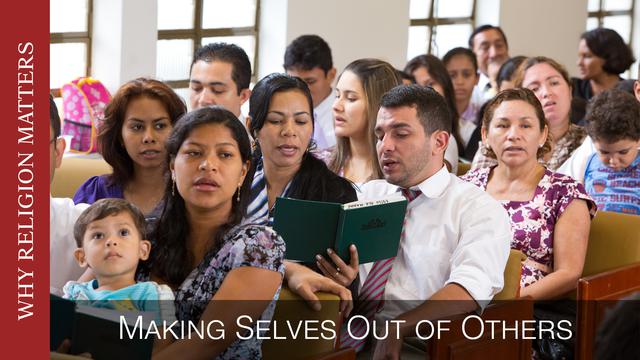“Together is harder, but together is better.” — Rabbi David Wolpe[1]
Why do people belong to religions? Some inherit a religion at birth while others may convert to one. But at one point or another people make a conscious decision whether to participate in their religious communities. In fact, the root word for religion is the Latin “religare,” which means to reconnect or bind. In an age that magnifies personal freedom, what could sound less attractive than “binding” oneself to the quirks and idiosyncrasies of a large group of people?

And yet a principle found in many religions is that there is little separation between you and the people around you. Jesus Christ put the charge quite simply: “love thy neighbor as thyself.”[2] In other words, your well-being is much more than aloof personal freedom; it is tied to your neighbor’s well-being also. And so, religious institutions can be helpful junctures where two cooperating impulses meet — the desire for individual purpose and the desire for communal belonging. Like all human goods, these impulses fit within a balance.
Institutional religions are certainly not the only source of all that is good in the world. Individuals can have fulfilling lives while quietly living out their own beliefs in private. But throughout history nothing has rivaled organized religion in its ability to foster commitment to concrete people who live in concrete places.[3] It is in this sustained engagement with neighbors that religion makes its lasting contribution.
Being part of a church is much more than just going to church. It fills people with identity, opportunity, aspiration, learning and many more personal blessings. But these come to individuals insofar as they look beyond themselves to others. Religion instills social responsibility and covenant-making in our lives, based not on self-interest but as a promise to God. This act of “binding” is one of the rare things in history that forges social obligations beyond family or tribe. Fellow believers are often in the best position to care for an ailing person, repair a neighbor’s house or fill in countless other gaps that we ourselves cannot fill. There are few, if any, organizations that can substitute for the community of a church.
Nevertheless, one of the defining features of our time is a waning trust in institutions, including religious institutions. As a result, many people are more isolated from families, communities and society at large. It is so easy to become atomized — breaking into islands of individuals untethered to larger associations. The writer David Brooks lamented the condition wherein “individuals don’t live embedded in tight social orders; they live in buffered worlds of private choices.”[4]
Societies that encourage materialism, individualism and moral relativism may promote what has been called the “sovereignty of self,”[5] but they weaken other values. The social thinker Michael Walzer urges caution: “This freedom, energizing and exciting as it is, is also profoundly disintegrative, making it very difficult for individuals to find any stable communal support, very difficult for any community to count on the responsible participation of its individual members.”[6]
Detached individualism contributes to the trend in society of being “spiritual but not religious.” What this often means is that faith is treated as a personal matter, not the business of other people. But there need not be a contradiction between the two. A person can be both spiritual and religious. In fact, the two are interdependent in vibrant religious lives.
As author Lillian Daniel says, "Anyone can find God alone in the sunset. It takes a certain maturity to find God in the person sitting next to you who has different political views, or when a baby who is crying while you're trying to listen to the sermon."[7] Yet these very inconveniences with other people give substance to our faith, enrich our human empathies and bolster our civic foundation.
In this age of falling trust and social disintegration, a return to the sacred commitments of congregations will make our communities more cohesive. When the fabric of society begins to fray, religion with its layered threads of social capital can help bind it together.
[1] Rabbi David Wolpe, “The Limitations of Being ‘Spiritual but Not Religious,’” Time Magazine, Mar. 21, 2013.
[2] Mark 12:31.
[3] See Jonathan Sacks, “The Moral Animal,” New York Times, Dec. 23, 2012.
[4] David Brooks, “The Secular Society,” New York Times, July 8, 2013.
[5] Jean Bethke Elshtain, Sovereignty: God, State, and Self (New York City, New York: Basic Books, 2008).
[6] Michael Walzer, Citizenship and Civil Society (Rutgers, N.J.: New Jersey Committee for the Humanities Series on the Culture of Community, October 13, 1992), part 1, pp. 11-12.
[7] Lillian Daniel, “Spiritual but not religious? Path may still lead to Church,” Winnipeg Free Press, Oct. 5, 2013.